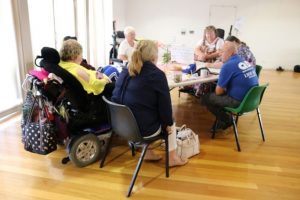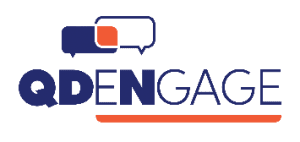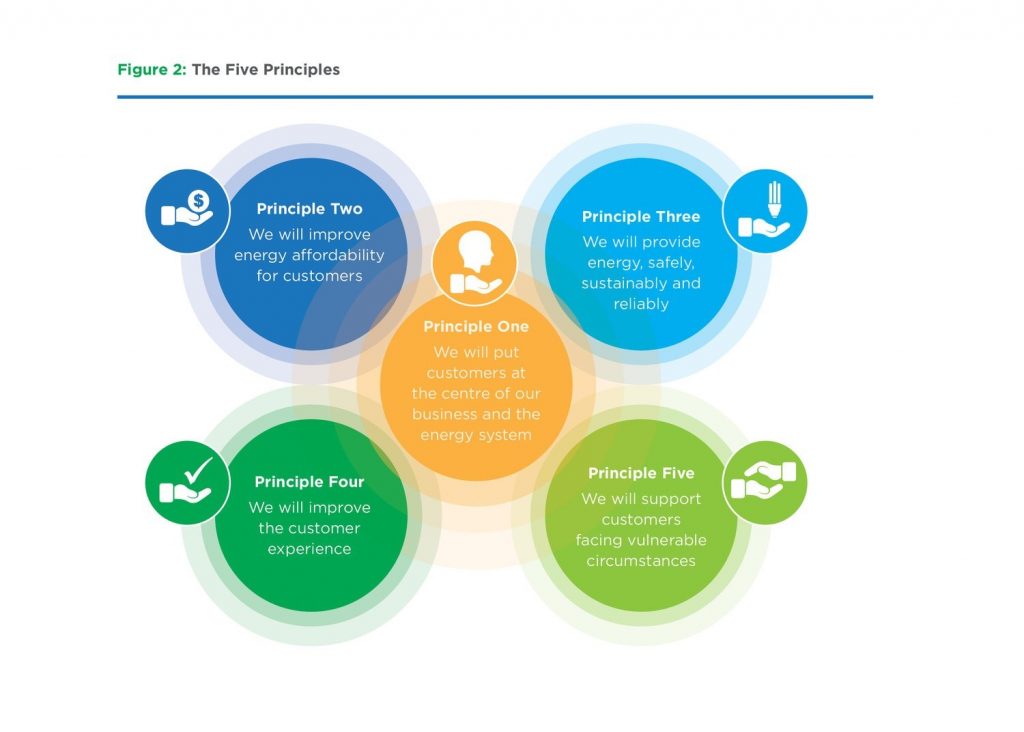Bi-monthly Update – November 2019
From the Chairperson
Welcome to the final e-Bulletin for 2019 and for this decade. I find it hard to believe that we move to a new decade in just a few weeks. In looking back on the past 10 years, there are many things that this decade has delivered to the Australian community and people with disability. Australia ratified the United Nations Convention on the Rights of Persons with Disabilities (UN CRPD) in 2008. This led us to kicking off this decade with the introduction of the National Disability Strategy 2010-2020 as the main
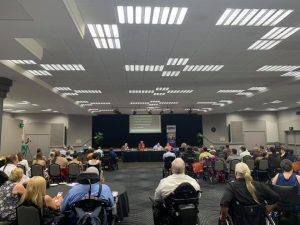
mechanism for the implementation of the UN CRPD in Australia. This was a historical moment as it was the first time all governments committed to a unified, national approach to disability policy. At the same time, the Government asked the Productivity Commission to carry out a public inquiry into a long-term disability care and support scheme. In July 2013, in response to the inquiry’s final report, the Australian Government introduced the NDIS, and subsequently the progressive roll out to the national scheme we have today, underpinned by the principles of choice and control. Change has bought with it some positive outcomes for people with disability and changes in policy and practice. However, as we close out this decade, I think there is still a long way to go. The next National Disability Strategy needs to be stronger in shaping and driving future change. It is critical that this new strategy delivers on outcomes and change for people with disability, and that these are measured and reported on. We all need to see how progress is being made and how we can all work together to make it happen. People with disability want a place to call home, we want jobs and employment, good transport, to play sport, go to school, study, to be safe, access to rights and justice, quality health and wellbeing, the supports we need to be able to live in and get around their communities. The National Disability Strategy 2020 – 2030 needs leadership, accountability, and commitment. Let’s make the 2020’s the decade of delivery. Let’s see real change that improves the lives of people with disability, their families and carers. Let’s work together to make the National Disability Strategy come to life and deliver on its outcomes so that we aren’t in the same place at the end of this new decade, reflecting on what could have been and what isn’t. I hope it is the decade for delivery and look forward to working with QDN members, allies and supporters across all levels of Government to make this happen.
QDN’s Annual General Meeting was held on 9 November 2019, and I would like to thank QDN members, supporters, allies, staff and my fellow Board Directors who were able to make it to the AGM. I think it was our biggest meeting yet, and it’s great to come together to reflect on the achievements of the year, the work that has been delivered, and the contributions that QDN members have made to informing, connecting, leading and influencing change in communities across the state. I would like to take the opportunity to warmly welcome our new appointed Director, Stacy Miller, who comes to QDN with a broad range of professional experience in the legal sector. We look forward to having you on board Stacy and working with you. It was also great to launch the digital stories at the AGM showcasing our local peer support groups, and our voluntary peer local group convenors. These groups are an important part of the fabric of peer support in their local communities, and I encourage you if you haven’t looked at them yet, to click on the website. There are more details in the articles below.
Thank you to all our QDN members who responded to our Annual Member Survey 2019. QDN members have provided a broad range of feedback about key issues and things that are impacting upon their lives. The top 5 issues most important to members were NDIS, community inclusion, health, housing/building standards and education. 54% of respondents to the survey had an NDIS plan in place, while 32% identified they were not eligible. Employing and managing staff and starting a new plan were the top two NDIS areas of highest interest. Other big picture policy issues that members identified where they see gaps for people are NDIS plans and transport costs, over 65 support and disability policy, access to the NDIS and the support people need to do so, and self-management. Some of the other issues raised were NDIS scheme and aged care interfaces and the need for more information, education, transition and consistency of services and the need for increased government awareness about the different needs for people with disability over 65.
I look forward to this new decade, the 2020’s, to be the decade of delivery for people with disability, their families, carers, providers and the sector. On behalf of QDN’s Board of Directors, I would like to wish all our QDN members, supporters and allies and the organisations and Departments we have worked with during 2019 a very merry Christmas and we look forward to continuing this work with you in the new year.
Nigel Webb, Chairperson
From the CEO
Accessible, affordable, secure housing for Queenslanders with disability has been a key issue and part of our work here at QDN. Housing is a fundamental need, and Queensland’s housing landscape is changing. People with disability make up a high percentage of tenants renting in private and public housing. I was pleased to see the Queensland Government’s package of tenancy reforms announced on Saturday 16 November 2019. These reforms will benefit all Queenslanders, now and into the future, given the growing population of people who will be renters for all or most of their lives. Every person has the right to a place they can call home. QDN members have consistently told us about the challenges they experience with trying to get modifications made to their properties to make them accessible and livable to their disability needs. These reforms will make a difference in the lives of Queenslanders with disability who are renting and make negotiations more straightforward and timely. QDN believes these reforms will go a long way to allowing renting Queensland households to make their house their home. The introduction of minimum housing standards including structural soundness, plumbing and drainage, security and control of pests and vermin, among others, will mean that QDN members won’t struggle so much to find safe, affordable, quality housing in the private rental market. The reforms which relate to pets is an important one for people with disability, particularly those who have animals to assist in decreasing social isolation and maintaining good mental health. People with disability experience violence and abuse at a higher rate than the general population, so I was also pleased to see the tenancy laws that will include additional protections for tenants experiencing domestic and family violence around breaking their tenancy, and access to rental bonds.
Rental housing reforms need to deliver balanced and fair laws for both tenants and landlords, and QDN welcomes these reforms and believes they go a long way to balancing the scales for renters and landlords.
QDN members have been also raising some issues with regards to Supported Independent Living within the NDIS plans. Some members have been left out of the conversation about their support needs and how SIL quotes are put together, leaving them without the information they need about what are their individual supports and what are shared supports in their plan. Without this information, people with disability and their families haven’t been able to make informed decisions and exercise their choice and control about the supports they want to purchase. QDN will continue to undertake work in this space to ensure that people with disability, no matter what their living arrangements, can get the support that fits with their goals, and they can exercise choice and control.
I was also pleased to see the changes announced this week to parking permits and parking fines. People with disability have varying needs when it comes to accessible options for getting about in community, and often with limited options for transport, accessible parking becomes an important enabler to people being able to go about their day to day life and do the shopping, go to the bank and go to the doctor. Access to parking permits will make a difference for people who are blind and vision impaired. Accessible parking spaces are designed to enable people to have access to a park that is in the right place, and right size to enable their mobility and access to community. It is important that only the people who need these places, i.e. people who have disability parking permits, park there and tougher fines will help drive change in people’s behaviour to ensure people who don’t have this need and park here for convenience think twice before doing so.
I would like to take this opportunity to thank QDN’s Board of Directors for all their work this year, to QDN’s staff, our Peer Local Support Group Convenors and to all QDN’s members, supporters and allies that we work with across the year, a big thank you. As the last e-Bulletin for the year, I would also like to wish everyone a very happy and safe Christmas and new year and look forward to working with you all in 2020.
Paige Armstrong, CEO
2019 Annual General Meeting
QDN’s Annual General Meeting was held on Saturday 9 November 2019 with over 70 people in attendance. We would like to thank all QDN members from across the state for your engagement, feedback, voice, experiences, efforts and energy, which is the heart of QDN. To our allies and supporters, we also extend our thanks for your work in partnership and delivering on common goals and outcomes.
We acknowledge the tireless efforts of retiring Appointed Director, Matt McCracken. The Board play an important role in setting the strategic direction of the organisation and the governance, and require a range of skills, knowledge and experience in the evolving legislative, market and compliance driven environment. The Board of Directors have identified key skills needed going forward, and as part of QDN’s Constitution which allows for Appointed Directors for a specific term, QDN’s Board are pleased to welcome Stacy Miller as an appointed Director who will bring a range of legal expertise and knowledge to the Board during her two-year appointed term.

After the AGM the Board met and re-elected Nigel Webb as Chairperson of the Board of Directors and John MacPherson as Vice-Chairperson. Des Ryan was re-elected as Chairperson of the Nominations and Performance Committee and Gary Matthews as Chairperson of the Audit and Compliance Committee.
Click here to access the full story.
Click here to access QDN’s 2018-2019 Annual Report, as a summary of our work and achievements this financial year.
A big thank you also to Flavio Correa who gave his time to play his music before and after the AGM.
Launch of the Local Support Group Digital Stories
Recently at QDNs Annual General Meeting, two digital stories were launched for the first time to celebrate QDN’s local support groups work to inform, connect, lead and influence people with disabilities in local communities across Queensland. The digital stories showcase QDNs peer groups and the work of peer groups across the State. QDN has 20 local support groups, operating from as far north as Normanton, down to the border; several towns coming down the coast, and also inland to towns like Toowoomba.
These groups are all led by voluntary group convenors who come together at various times throughout the year. The groups play a vital role in connecting people with disability together, regardless of the type of disability, and this is largely due to the essential role of the local group convenors. The local group convenors are a group of passionate QDN members who want to encourage & empower people with disabilities in their local communities, by sharing information that will inform people with disabilities of the opportunities for greater inclusion in the local community and beyond.
The following digital stories tell the story of QDNs local groups and acknowledge the convenors that put in so much hard work to run those groups.
Click here to access the videos.
International Day of People with Disability Tuesday 3 December
International Day of People with Disability is a United Nations sanctioned day that is celebrated across the world. It aims to increase public awareness, understanding and acceptance of people with disability and celebrate their achievements and contributions.
Each year the UN announces a theme to observe for International Day of People with Disability. The annual theme provides an overarching focus on how society can strive for inclusivity through the removal of physical, technological and attitudinal barriers for people with disability.
The theme for International Day of People with Disability for 2019 is ‘Promoting the participation of persons with disabilities and their leadership: taking action on the 2030 Development Agenda’. 2019’s theme focuses on the empowerment of persons with disabilities for inclusive, equitable and sustainable development as envisioned in the 2030 Agenda for Sustainable Development, which pledges to ‘leave no one behind’ and recognizes disability as a cross-cutting issues, to be considered in the implementation of its 17 Sustainable Development Goals.
QDN encourages members across Queensland to celebrate your leadership in communities across Queensland, and all you do to contribute to an inclusive community where people with disability can lead change, have a say and influence. There are events being held and QDN will send members more information. QDN is pleased to be partnering with QCOSS and Queensland Human Rights Commission to host Changing Lives Changing Communities in Caboolture on 3 and 4 December. See below for more information.
Click here for more information on how people can get involved in the day and how to break down barriers (both structural and attitudinal) for people with disability.
Human Rights Day Tuesday 10 December
December 10 is the anniversary of the adoption by the United Nations (UN) of the Universal Declaration of Human Rights (UDHR). The UDHR sets out a certain set of rights that are the basic and minimum set of human rights for all citizens. December 10 will be a momentous occasion, particularly for Queensland, as this is the first time Queensland has a Human Rights Act.
Setting aside a day to commemorate, educate and reflect on the principles that form the UDHR means celebrating the rights we exercise everyday as Australians, and acknowledging that enjoying those rights carries with it the responsibility of promoting these rights for all people.
Things that many of us take for granted – such as the right to an education and the right to receive medical care – are not equally available to all Australians and people in other parts of the world. Many individuals and communities will be commemorating and celebrating December 10 and pledging a commitment to maintain and improve people’s human rights wherever possible.
ASID Conference Presentation
As part of work that QDN has been involved in, Michelle Moss (Business Development and Operations Manager) and Donna Best (Hot Topics Local Support Group Convenor) were part of a group to present at the National Australasian Society of Intellectual Disability (ASID) Conference in November in Adelaide, along with Paul O’Dea (IYHG), Morrie O’Connor (Community Living Association) and Belinda Drews (Community Services Industry Alliance). The presentation, The Long and Winding Road – Next Big Step, talked about the work that the group has recently done to make the Theory of Change accessible for everyone. Theory of Change is used often by organisations as a way of planning, designing and evaluating work and projects to bring about change. The group presented on how they used this process to come up with a project proposal, shared vision and plan that formed a grant application.
Click here to access the Theory of Change workbook.
Launch of Get Ready Queensland Week
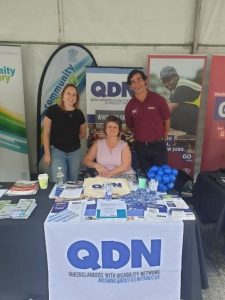
QDN was invited to have a stall at the Get Ready Queensland Week launch that was held in Brisbane’s King George Square on Monday 14 October. Get Ready Queensland Ambassador Johnathan Thurston kicked off the launch along with Minister responsible for the Queensland Reconstruction Authority Cameron Dick and Minister for Fire and Emergency Services Craig Crawford. QDN talked about what people with disability can do to prepare for disasters and how people can develop individual plans. This builds upon the work QDN has been doing funded by Department of Communities, Disability and Seniors Community Recovery with the University of Sydney and Community Services Industry Alliance in the Disability Inclusive Disaster Risk Reduction project.
Stuartholme Civic Advocacy Forum
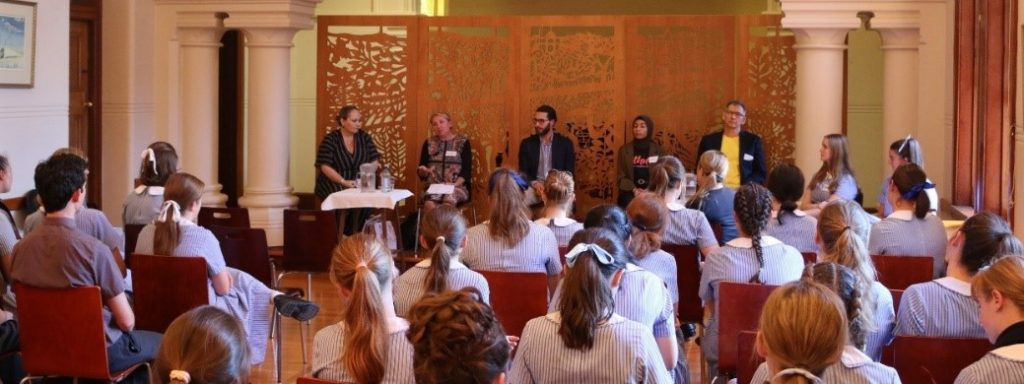
QDN was recently invited to contribute to the Stuartholme Civic Advocacy Forum. Michelle Moss, QDN Business and Operations Manager, joined the panel to speak with an audience of Brisbane high school students about what change is possible when voices in the community connect and work together for collective action.
NDIS Access Information Session for Health Professionals in North Queensland
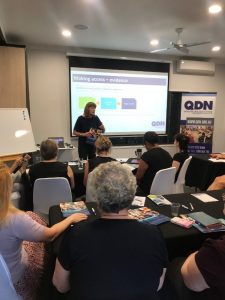
QDN’s Cairns Local Support Group recently hosted an information session with health professionals in Far North Queensland with their role as part of the NDIS access. Cairns and surrounds have recently started to transition to the NDIS. Over 20 attendees attended, and Paige Armstrong, QDN CEO, discussed learnings from QDN’s Peer to Peer Advocacy and Getting on the NDIS Grid projects, tips from QDN’s GP Toolkit, and how local health professionals can assist people with disability to navigate NDIS access.
Developed by QDN, the GP Toolkit: Understanding your role in the NDIS is available and contains a range of information for GPs, allied health professionals and practice staff and tips to assist in completing access request documentation for patients.
This NDIS access information session for health professionals followed an earlier event hosted by the Cairns Local Support Group around NDIS access information for people with disability and their supporters. This session discussed NDIS access tips from QDN’s Patient Information Booklet and connected attendees with local organisations that can assist with the NDIS access process. For peer support to navigate the NDIS access process in your local area, make sure to connect with your QDN Local Support Group. Click here to access more information.
Disability Royal Commission Update
The Disability Royal Commission is now underway. As of 30 October, the Disability Royal Commission has received 177 submissions, 600 calls and 900 emails. QDN understands over the term of the Disability Royal Commission there will be public hearings across each of the domains, including:
- Homes and living
- Relationships
- Education and learning
- Economic participation
- Health
- Justice
- Individual autonomy
- Self-determination and the dignity of risk
- Community participation
- Geographical challenges.
QDN understands that for each domain, the Commission will release an issues paper and individuals and organisations can provide a response to each issues paper.
Submit your Feedback to the DRC Education and Learning Paper
The Royal Commission has identified that abuse, neglect and exploitation of people with disability in the education sector is an important area to address. The Royal Commission issues paper on education outlines the Commission’s preliminary understanding of the key issues and barriers experienced by students with disability and asks 13 questions.
Click here to access the Issues paper in a range of formats.
The Royal Commission is encouraging responses from individuals and organisations to the issues paper by 20 December 2019 although submissions will be accepted after that date.
QDN will be responding to this and other issues papers released by the Disability Royal Commission. To provide feedback on QDN’s response to the Education paper please call QDN on 1300 363 783 or email kswift@qdn.org.au by 10 December. QDN will keep members informed of other issues papers as they are released.
Other Disability Royal Commission News
In summary:
- The recent Townsville Hearing had a focus on education, including inclusion of people with disability and the Queensland government’s role in education. Click here to access the webcast of the First Hearing of the Royal Commission into Violence, Abuse, Neglect and Exploitation of People with Disability, streamed live from Townsville, Qld, Nov 4-7, 2019.
- Community Forums about the Disability Royal Commission have been held in Adelaide, Gawler and Hobart in November. People with disability, parents and service providers shared their experiences of residential services, group homes, Disability Employment Services, incidences of violence and abuse and the quality of services for people with sensory disability.
- The next hearing will take place in Melbourne from 2 to 6 December and will look into the homes & living experiences of people with disability in Victoria, including people who have lived or who are now living in group homes in Victoria.
How People Can Get Help
You can get the following supports in relation to the Disability Royal Commission:
- Applications are open under the Legal Financial Assistance Scheme for individuals and entities to seek reimbursement for their reasonable legal representation and disbursement costs resulting from the Commission. Click here for more information.
- National Counselling and Referral Services commenced on 17 October 2019 and are available for people with disability, their families and carers, and anyone affected by the Royal Commission. Click here for more information.
- The National Disability Advocacy Program has been funded to provide individual advocacy support for people who need extra support to engage with the Royal Commission. Click here for more information.
- A National Legal Advisory Service has been established. Click here for more information.
For More Information
To find out more about the work of Disability Royal Commission and its upcoming community forums and hearings, click here to visit the website or sign up to the mailing list by emailing DRCmailinglist@royalcommission.gov.au to ensure you receive the latest news and notifications about public events and hearings.
Royal Commission into Aged Care Quality and Safety
On the 31 October 2019, the Royal Commission released the Interim Report into the Quality and Safety of Aged Care. The Interim Report shows that aged care providers are falling short of delivering safe, high quality aged care and exposed numerous examples of neglect, abuse, mismanagement and under resourcing.
The Interim Report Commissioners identified three areas that require immediate action; to provide more Home Care Packages to reduce the waiting list for high care at home, to respond to the significant over reliance on chemical restraint in aged care, including through the seventh Community Pharmacy Agreement, and to stop the flow of younger people with disability going into aged care and speeding up the process of getting those younger people who are already in aged care out.
On 13 September 2019, the Royal Commission was granted an extension to enable it to undertake further hearings and inquiry work to address the remaining matters in its Terms of Reference. The Commission’s delivery date for the final report has been extended from 30 April 2020 to 12 November 2020 to ensure the Commission has enough time to thoroughly conduct its inquiry and to develop a set of recommendations.
QDN intends to make a submission to the Royal Commission into Quality and Safety in Aged Care. QDN wants to hear from members about this and early in the New Year we will be putting out a call to QDN members asking those who have had interactions with the Aged Care sector, to share their experiences, so they can be included in our submission to the Royal Commission. Members can also make their own submissions to the Royal Commission.
Click here to access the Interim report.
Click here to make a submission or phone 1800 960 711 for further assistance.
QDN Projects
QDN’s Self-Management Project
Following on from the Self-Management Co-design Session with Local Support Group (LSG) Convenors on 3 October, QDN has been developing a range of resources for QDN’s Local Support Group Convenors to use to support people with disability through the local support groups to get more information about self-managing their NDIS plans. These resources will also be available for QDN members once finalized.
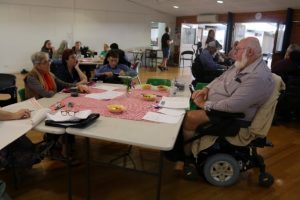
Through the co-design process the following range of resources have been identified:
- Self-Management – What is it?
- Employing Supports and Services
- Managing Funding
- Safeguarding
On 8 November a further co-design session was held with the LSG Convenors to review the proposed topic areas for each of the four topics above. These will be ready in early 2020.
Everyday Practice Project: QDN part of Consortium Delivering Information for NDIS Providers and Participants about Quality and Safeguards
Throughout October and November QDN has been working on the development of user-friendly resources and tools regarding the NDIS Quality and Safeguards for the Everyday Practice project. This project has been funded by the NDIS Quality and Safeguards Commission as part of national work. The primary purpose of the Everyday Practice project is to help NDIS providers comply with their day-to-day NDIS obligations (Everyday Practice) and for people with disability to understand Quality and Safeguards, their roles and responsibilities. The project delivers co-designed resources for people with disability, through the lens of NDIS participants’ experience. QDN has held co-design sessions with people with disability to their gather valuable insights and ideas for the content related to the following areas:
- Launch – Quality and Safeguards
- Topic 1 – NDIS Provider Registration and NDIS Participant Safety and Well-being
- Topic 2 – The Core Practice Standards and The NDIS Code of Conduct
From the beginning of January QDN will be undertaking further co-design sessions with people with disability as subject matter experts to provide advice and feedback on the remaining topic areas being developed by the project. These include:
- Topic 3 – Complaints and Incident Management
- Topic 4 – Privacy, Consent and Record Keeping
- Topic 5 – Person-Centred Compliance: What a ‘Best Practice Compliance Provider’ Looks Like.
The website, the first introduction, Topic One and Topic Two will be launched in January 2020. Stay tuned for further information.
Changing Lives, Changing Communities
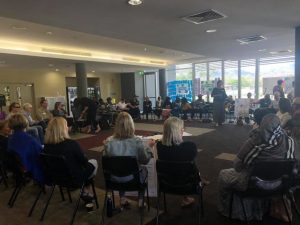
The second year of Changing Lives, Changing Communities forums is off to a fantastic start, as communities come together across Queensland to continue the conversation around the question ‘how do we create a community where everyone contributes, matters, and belongs?’.
In September over 60 people from the Toowoomba community, and in October over 60 people in Mackay, came together to reflect on the past year and the changes they have seen in their communities. QDN, the Queensland Council of Social Services and the Human Rights Commission Queensland hosted these important conversations, alongside a local organising team, and saw individuals in the community take their place leading and working with others on their own projects of inclusion.
On the 26 and 27 of November, the Townsville community came together for their fourth year of Changing Lives Changing Communities, with Townsville City Council leading the way in the planning and organising of this year’s forum. Over 350 people in the past four years have been part of these conversations in Townsville, and a range of change-making projects and ideas have been led by the community.
Click here for further information about past and future forums, located on the QDN website.
Upcoming CLCC forums:
- Brisbane – 25th & 26th February 2020
- Gold Coast – 12th & 13th May 2020
- Normanton – 27th & 28th June 2020
It’s Time to QDeNgage
QDeNgage Representatives have been hard at work recently connecting with community organisations, departments, and businesses in order to improve the products and services available to all members of the community. From training local government staff to speaking at forums of industry bodies to contributing to housing consultations, QDeNgage Representatives have been engaging with the wider community to provide feedback and advice based on their lived experience with disability and helping shape a more inclusive Queensland.
QDeNgage is an initiative by Queenslanders with Disability Network (QDN) where QDeNgage Representatives share their knowledge and lived experience to help increase the inclusivity of products and services provided by other parties. QDeNgage Representatives are QDN members and people with disability who can receive payment for contributing their advice and personal expertise to consultations.
For more information about QDeNgage and to apply to offer the wider community your feedback as a QDeNgage Representative, click here.
Policy Updates
NDIS
Important NDIS Announcements
NDIS Minister Stuart Robert gave a speech at the National Press Club on Thursday 14 November 2019 where he talked about his plan to get the NDIS working better for everyone who needs it. Key announcements include:
- From July 2020 participants will be able to use their funds more flexibly – including moving funds between core and capacity building.
- The NDIS will begin a pilot to test the use of independent assessments across the full range of disability types, ages, cultural backgrounds and circumstances. Following the completion of the pilot to Government’s satisfaction, the use of independent functional assessments – paid for by the NDIA – will be fully implemented in the access and planning pathways from 1 July 2020.
- Joint planning meetings will roll out nationally next year. People will also be able to see a draft of their plan before it’s approved.
Click here to access more information.
NDIA Information about the Annual NDIS Price Review 2020-2021
The NDIS Annual Price Review 2020-2021 is now underway. The National Disability Insurance Agency (NDIA) has released an NDIS Annual Price Review 2020-2021 Issues Paper which is available on the NDIS website. The NDIA are inviting responses to the paper and QDN will be making a submission. Please contact QDN if you have any issues you want included.
In early 2020, the NDIA will publish a draft report of findings of the Review. In April 2020, recommendations for proposed pricing changes will then be presented to the NDIA Pricing Reference Group for consideration. The NDIA CEO and Board will review and approve any recommendations before announcing changes for implementation of any changes from 1 July 2020.
Click here to access more information.
State of the Disability Sector Report 2019 Released
National Disability Services (NDS) has released its State of the Disability Sector Report for 2019. The report highlighted several issues concerning implementing the NDIS and proposed 12 actions including:
- Prices and funding models that stimulate growth and quality
- Sector development that supports transition and progress
- Market stewardship that responds to warning signs of market failure
- NDIS processes informed by experience
- Flexibility that reflects national diversity
- Resolution of complex design problems
- Investment in quality and safeguarding
- More open employment opportunities
- Extended school-to-work support
- More job opportunities for people with disability
- An appropriately resourced National Disability Strategy
- A National Mental Health Strategy
Click here to download the full report and fact sheet.
New Easy Read Website Content for the NDIS on Employment
The new Easy Read content for the NDIS website is now live. The Easy Read content includes information about employment, including services that are available in the community and how to get ready for important conversations about work. The Easy Read content is published alongside the original content. Users of the site can use a toggle button to easily switch between the original and Easy Read formats.
Click here to access the Easy Read employment content.
Health
Health and Intellectual Disability
Australia’s Health Minister Greg Hunt has announced very positive outcomes from the recent Roundtable on the Health of People with Intellectual Disability. The Minister has released a draft national road-map for improving health services for people with intellectual disability. The road-map includes a wide range of measures including short-term measures focused on:
- Programs in Primary Health Networks (PHNs) to improve the capacity and skills of GPs and other primary health services to meet the needs of people with intellectual disability. This will initially be in four PHN-lead sites with a view to national roll-out after four years.
- Better use of existing Medicare items, including those for annual health assessments of people with intellectual disability.
- Better coordination between the health sector and other sectors such as disability and education.
- Support for people with intellectual disability and their families so that they can make informed decisions about healthcare and navigate the healthcare system.
There will be a second Roundtable in early 2020 to further develop the road-map.
Click here to access more information.
Productivity Commission Releases Draft Report on Inquiry on Mental Health
The Productivity Commission has released a draft report on its inquiry into mental health in Australia. The report examines the ability of the health system and other associated service infrastructure to respond to the needs of people experiencing mental ill-health, focusing on prevention, early detection and access to suitable treatment.
The report identifies recommendations for substantial changes to Australia’s mental health system through implementation the following priority reforms:
- Prevention and early intervention for mental illness and suicide attempts
- Closing critical gaps in healthcare services
- Investment in services beyond health
- Assistance for people with mental illness to get into work and enable early treatment of work-related mental illness
- Fundamental reform of care coordination, governance and funding arrangements

Click here to access the draft report.
Click here to access the national hearings.
Tracking Transitions of People from Mental Health Programs into the NDIS: Final Report
Community Mental Health Australia (CMHA) and The University of Sydney have, over an 11-month period, collected, analysed and reported on national data regarding the NDIS transition, or otherwise, of clients living with serious mental illness from three Commonwealth funded programs. Key findings from the report include:
Key findings:
- Overall, 50% of people currently using Partners in Recovery (PIR), Personal Helpers and Mentors (PHaMs) and Day to Day Living (D2DL) have not yet applied for NDIS. 1578 (19%) of the 8162 people in this report do not want/are unable to apply or have, to date, not started the complex process of building the evidence required to apply.
- Of the 50% of people who had applied, only half had been assessed as eligible, a quarter had been found ineligible and a quarter were still waiting to be assessed, or the outcome was unknown.
- Of the currently active PIR, D2DL and PHaMs clients, 25% are now supported through the NDIS and 75% are not.
- There are also continuing problems within the NDIA. The 61 programs reported wild variance in: the proportion of people with eligible/ineligible outcomes, the lengths of time people had to wait for applications to be assessed, and for those found eligible, the length of time before they received their plan, and the appropriateness of plans.
Click here to read the full report.
$1.85 Million Upgrade for Patients at PA Hospital Spinal Injuries Unit
Premier Annastacia Palaszczuk has announced $1.85 million for vital upgrades to patient amenities in the state’s Spinal Injuries Unit (SIU) at Princess Alexandra Hospital (PAH).
Click here for more information.
Metro South Health Updates:
Trauma Informed Care for Aboriginal and Torres Strait Islander People
Trauma-Informed Care and Practice: A guide to working well with Aboriginal and Torres Strait Islander peoples will help ensure hundreds of Aboriginal and Torres Strait Islander patients receive culturally appropriate care.
Click here to access the resources to learn more about the Trauma Informed Care approach.
Click here to visit the Way Forward Trauma Informed Care website or for more information, contact the team via WayForward@health.qld.gov.au for the best implementation advice.
Julian’s Key Health Passport – Logan Hospital Trial
The Julian’s Key Health Passport is a care summary which makes it easy for people with disability and their families to:
- write down their care needs and preferences, and
- easily share the information with health professionals.
Julian’s Key was developed by West Moreton Hospital Health Service and is being trialed at Logan and Ipswich Hospitals. Julian’s Key is available as:
- a smartphone app (from Apple and Android app stores).
- an editable PDF from the project website. Click here to access the PDF.
- it can be printed and written by hand.
Subscribe for Metro South Health Updates
Metro South Health is offering eNews updates about disability, Aboriginal and Torres Strait Islander and multicultural health issues. All interested community members, health and community care workers are welcome to subscribe.
Click here to subscribe.
Housing
Specialist Disability Accommodation (SDA) Innovative Plan
NDIS Minister Stuart Robert recently released the SDA Innovation Plan. The SDA Innovation Plan outlines the activities the NDIA will undertake over the next 18 months to encourage innovation in SDA. The Innovation Plan and its outcomes aim to provide greater flexibility and choice for participants when it comes to housing. The insights gained through our consultations with QDeNgage participants contributed to the formulation of the plan.
Click here for more information and to download the Innovation Plan.
Renting in Queensland
QDN welcomes the Queensland Government’s package of tenancy reforms announced on Saturday 16 November 2019. QDN believes these reforms will go a long way to allowing renting Queensland households to make their house their home, particularly people who need to make minor modifications to their rental property to ensure it is accessible.

Click here for more information.
Brisbane City Council Universal Housing Design Incentive
Brisbane City Council has introduced the Universal Housing Design Incentive to encourage new dwellings that are designed to cater to the accessibility needs of all residents, including residents who are ageing, have a disability or are injured, and families with young children.
As part of the new Universal Housing Design Incentive, Council will make a financial payment equivalent to 33% of Council infrastructure charge paid for newly constructed developments that:
- include sufficient design elements to be certified as meeting the Gold or Platinum performance level under the Livable Housing Design Guidelines; and
- meet seven Council defined eligibility criteria.
The Universal Housing Design Incentive encourages development in Brisbane that is accessible to the whole community. To find out more information on the Universal Housing Design Incentive, call Council on 07 3403 8888 to speak to a Council Planning Information Officer. Alternatively, you can find out more about Livable Housing Australia Design Guidelines by clicking here.
UN Recommends that Australia Mandate Access in Housing
As a result of the recent sitting of the Committee on the Rights of Persons with Disability, the following statement has been made in the UN Concluding Observations Report 2019:
“The Committee is concerned about the significant proportion of existing inaccessible built environment and the lack of mandated national access requirements for housing in the National Construction Code; and in Para 18.b.:
“In the light of article 9 of the Convention and its general comment No. 2 (2014), the Committee recommends that [Australia] . . . amend the Federal law with mandatory rules on access for all new and extensively modified housing.” (p. 5)
Click here to download the full report.
Energy
The Energy Charter
Energy businesses have committed to the Energy Charter to progress the culture and solutions required to deliver energy in line with community expectations. The Energy Charter is industry led and is a world-first whole-of-sector initiative to address customer expectations. Work on the Energy Charter commenced in February 2018 and it took effect from 1 January 2019.
The Energy Charter is a principles-based disclosure regime that can be applied to all businesses across the gas and electricity supply chains. Those who commit to the Energy Charter will agree to publicly disclose how they are delivering against the Energy Charter Principles. It is critical that energy businesses are transparent and accountable for their statements. An independent accountability panel will review disclosures and produce an annual evaluation report.
Click here to download the Energy Charter.
Human Rights
2019 UN Outcomes Report
The UN Committee on the Rights of Persons with Disabilities has published its findings on its recent review of how Australia is meeting its obligations under the Convention on the Rights of Persons with Disabilities (CRPD).
The findings cover how Australia is doing regarding the rights of persons with disabilities, and covers positive developments, areas of concern, as well as listing the committee’s recommendations for Australia to action. The Report recognised the positive work that Australia has undertaken. However, the Report also revealed that the committee is deeply concerned about:
- The serious delays to releasing the 3rd Implementation Plan under the National Disability Strategy (NDS) 2010 -2020;
- The lack of engagement and limited funding of Disability Representative Organisations (DRO’s) under the NDS and National Disability Agreement (NDA) to ensure that persons with disability are fully engaged through their representative organisation in policy development, implementation and monitoring of actions relating to the Convention;
- Disability assessments under the NDIS are still relying heavily on the medical model of disability;
- The NDIS not providing equal opportunities for older persons with disabilities;
- The NDIS being inaccessible because it is complicated to access, and a lack of services in remote areas;
- The lack of sustainable and well-resourced individual & independent advocacy programs.
Some of the committee’s recommendations for Australia include the following:
- Bringing Australia’s legislation in line with the Convention, and carrying out Disability Rights Impact Assessments on any legislative changes that may impact the rights of persons with disabilities;
- Rolling out the 3rd Implementation Plan for the National Disability Strategy, and ensuring that it is fully resourced, and includes active participation & consultation with diverse organisations of persons with disabilities, and the recommendations made by the Productivity Commission are implemented;
- Reviewing disability assessment criteria for the NDIS to bring the criteria in line with the human rights model of disability;
- Making the NDIS easier for people with disability to use and making sure that all information is accessible;
- Ensuring that all Australians with disabilities have access to ongoing, sustainable and well-resourced individual and independent advocacy programs, especially outside of the NDIS.
Click here to access the full report.
Local Support Group Update
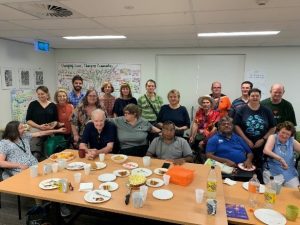
Our Local Support Groups continue to meet and provide peer support to each other about important issues for group members. A range of diverse guest speakers have recently presented to groups on topics such as Self-Advocacy, Enhancing your Health, Avoiding Scams, Nutrition, and Learning.
October was an active month for Local Support Groups with Group Convenors gathering together for two days to discuss a range of updates, projects, and resources to distribute to group members.
The Deception Bay group enjoyed holding their first meeting in their new home at the Darts Club and the Brisbane Hot Topics Group held a special meeting to celebrate Willie Prince’s retirement from his job at the State Library after 32 years.
Up north, the Cairns Local Support Group also hosted an information session and panel on accessing the NDIS where over 30 attendees learned tips about the process and what local assistance is available through peers and community organizations.
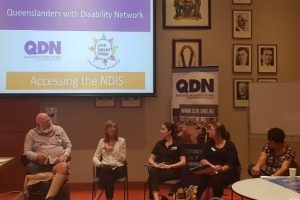
Before the year wraps up, make sure to keep an eye out for two digital stories showcasing inclusive community opportunities that the Deception Bay and Gold Coast Hot Topics groups have each been hard at work on!
Why Come Along to A Local Support Group?
QDN has 20 Peer Local Support Groups in communities across Queensland that meet in person and virtually. The groups are led by people with disability for people with disability. Hear from QDN’s Local Support Group Convenors about the benefits of being part of a peer network and why you should come along.
Click here to access the video.
From our Friends
Farmers with Disability Get Back to Work Through Innovation and Ingenuity
Australian farmers with a disability are being encouraged to connect with their peers to aid their return to work, despite funding challenges for support services.
Click here to listen to the full ABC story.
Have Your Say – Green Bridges for Brisbane Program
Brisbane City Council is building five new green bridges across Brisbane to make it even easier for you to get around the city using public transport, or by bike or on foot. The new bridges will link Kangaroo Point to the CBD, Toowong to West End, St Lucia to West End as well as new crossings at Breakfast Creek and Bellbowrie.
Your feedback will play a critical role in further defining the benefits of each green bridge, including their final alignments, landing locations and design treatments. Initial consultation regarding the five bridges will be held in November and December 2019. If you would like to be involved or have any other questions about the Green Bridges for Brisbane program, please contact Brisbane City Council by email at GreenBridges@brisbane.qld.gov.au or free call 1800 318 166 (during business hours).
Gold Coast Fresh Futures Market Post School Options Expo
Gold Coast Fresh Futures Market is on again and is set to be Gold Coasts biggest and best free post-school options expo for people with disability, carers and the wider community. There will be a wide range of stakeholders from the disability sector to bring this event to life.
Among treasure hunts, prizes, guest speakers and an exclusive ‘Exhibitor Guide’ available for attendees to take away, the NDIA will be there in person with their own private space to answer all questions NDIS related.
When: Wednesday 20 May 2020
Time: 10:00am – 4:00pm
Where: HOTA – Home of the Arts, 135 Bundall Rd, Surfers Paradise
Click here for more information.
INAS World Games
The INAS World Games was held on 12-19 October in Brisbane. The INAS Global Games is a global, international multi-sport event every four years organised by the International Sports Federation for Persons with Intellectual Disability (INAS). 1,000 athletes from 47 countries competed across 10 sports.
Click here for highlights from the games.
ATSIDNQ Update
Over the past two months, ATSIDNQ have been working hard in the community and have welcomed 63 new members. All new members received the ‘Welcome to Members’ letter and kit, including new ATSIDNQ merchandise – towels, hats, bags, scarfs and fridge magnets.
ATSIDNQ has been involved in the Brisbane Disability Expo in November and will also be working on developing strategies to grow the yarning groups particularly in Hervey Bay and Maryborough in 2020. ATSIDNQ will also have a presence at the upcoming International Day of People with Disability in Hervey Bay. ATSIDNQ have held two Champions Breakfasts, where they discussed the Strategic Planning for 2020, how to go about recruiting champions across the regions, and ways to partner with community organisations within regions to get practical support and service delivery activities happening.
In the future, ATSIDNQ will continue to focus on these issues. Yarning groups will be a big priority in 2020, as will recruiting champions within broader regions and communities.
Click here to access more information about ATSIDNQ.
Contact Us
Phone: 3252 8566 or 1300 363 783 Email: qdn@qdn.org.au

